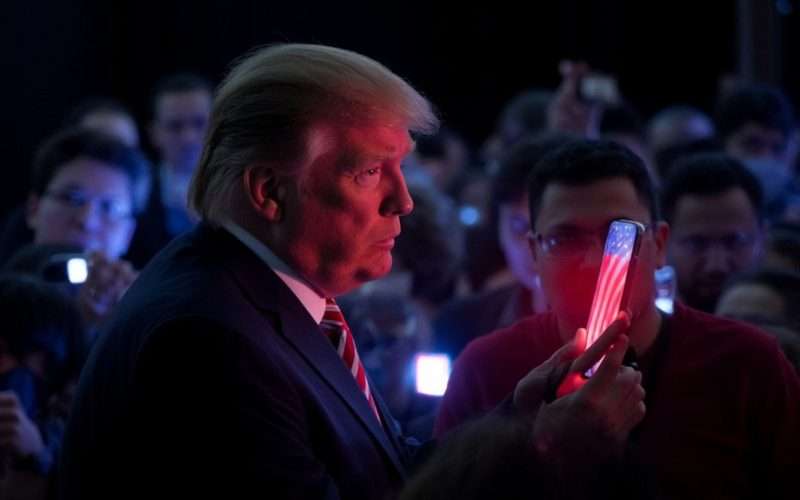Trump’s smartphone venture epitomizes technopopulism by leveraging digital platforms to bypass traditional media and directly engage supporters. Priced at €43.60 monthly, the device represents more than a communication tool—it’s a political statement blending nationalist technology branding with direct voter connectivity. By transforming technology into a patriotic enterprise, Trump challenges existing tech industry practices while creating an unfiltered channel for political messaging. Intriguing complexities await exploration.
The Political Smartphone Strategy
A digital revolution is brewing in political communication. Donald Trump’s smartphone strategy represents a novel approach to voter engagement, leveraging direct digital connectivity to bypass traditional media channels.
By proposing a dedicated communication platform, Trump aims to create an unfiltered connection with supporters, potentially reshaping political messaging dynamics. This strategy reflects an emerging trend of technopopulism, where political leaders use digital technologies to cultivate direct relationships with constituents.
The smartphone plan signals a significant shift in political communication, suggesting that personal digital platforms might become increasingly central to political strategies and voter outreach.
Market Disruption or Political Statement?
While the Trump Mobile venture appears to blur the lines between political messaging and commercial enterprise, its underlying motivations seem more symbolic than substantive. The $47.45 monthly price tag—referencing Trump’s presidential status—suggests a political statement rather than a serious business strategy.
Industry experts question the venture’s economic viability, noting the challenges MVNOs face in maintaining profitability and the complex telecommunications landscape. The announcement’s minimal impact on carrier stock prices further indicates limited market disruption potential. Ultimately, the venture seems designed to amplify political messaging and capitalize on Trump’s brand loyalty among his supporters.
Nationalist Technology Branding
Although rooted in political messaging, Trump Mobile’s nationalist technology branding represents a strategic attempt to leverage patriotic sentiment and technological nationalism. By emphasizing „proudly designed and built in the United States,” the venture targets consumers who prioritize domestic manufacturing and align with Trump’s political ideology.
The smartphone launch appears calculated to challenge existing tech industry practices, particularly tensions with Apple over manufacturing locations. This approach transforms technology into a political statement, appealing to a base that values nationalist economic principles.
The Trump Organization’s licensing of its name further monetizes the brand’s political capital, positioning the mobile device as more than just a communication tool.
Economic and Manufacturing Claims
Trump Mobile’s economic and manufacturing claims reveal a complex landscape of technological nationalism and market positioning. The smartphone’s assertion of being „proudly designed and built in the United States” remains ambiguous, with limited transparency around actual production details.
Within a market dominated by major carriers like Verizon, AT&T, and T-Mobile, Trump Mobile represents a marginal MVNO player. Experts have raised skepticism about the venture’s financial sustainability, suggesting that achieving 1 million subscribers would be critical for economic viability.
The announcement strategically coincides with broader tensions surrounding domestic technology manufacturing and international production strategies.
Wireless Industry Landscape
The U.S. wireless industry represents a complex ecosystem dominated by three major national carriers: Verizon, AT&T, and T-Mobile. While these giants control the majority of market share, mobile virtual network operators (MVNOs) have emerged, targeting niche consumer segments.
Despite their innovative approaches, MVNOs currently account for only 3-4% of wireless subscriptions, facing significant challenges such as high customer churn. Success stories like Mint Mobile demonstrate potential, yet sustained growth remains difficult.
The entry of new players like Trump Mobile must navigate this competitive landscape, where achieving meaningful market penetration requires attracting at least one million subscribers to establish financial viability.
Potential Conflicts of Interest
Potential Conflicts of Interest
A persistent concern surrounding Trump Mobile emerges from potential conflicts of interest that could compromise ethical governance and commercial transparency. The president’s extensive financial disclosures reveal over €550M in income from various ventures, with recent crypto and mobile projects raising significant questions about leveraging political influence for personal financial gain.
Harvard legal experts highlight these business maneuvers as potential ethical breaches, particularly when licensing deals and commercial relationships remain opaque. Critics argue that such ventures ultimately enrich the Trump family’s wealth, potentially undermining public trust and blurring boundaries between personal business interests and governmental responsibilities.
Technical Specifications and Pricing
Smartphones with distinctive pricing strategies often capture market attention, and the €459.98 Trump Mobile device follows this trend by offering competitive technical specifications and service plans. The device, labeled the „T1 Phone,” will provide 5G connectivity through major carriers like Verizon, AT&T, and T-Mobile.
Priced at €43.71 monthly—a symbolic reference to Trump’s presidential terms—the service includes attractive features such as telemedicine, unlimited texting, and roadside assistance. Marketed as „proudly designed and built in the United States,” the smartphone aims to differentiate itself through national manufacturing and extensive service offerings.
Consumer Appeal and Market Challenges
Consumer Appeal and Market Challenges
Consumer interest in the Trump Mobile service hinges on its unique value proposition and potential political resonance. The $47.45 monthly subscription offers 5G service, telemedicine, unlimited texting, and roadside assistance, potentially attracting politically aligned consumers.
However, mobile industry experts remain skeptical about the venture’s long-term sustainability. Mobile virtual network operators typically face significant market challenges, including high customer churn and profitability difficulties.
The „T1 Phone” marketed as an American-made product might appeal to nationalist sentiment, but technical and economic barriers suggest limited market impact. The service’s success will depend on overcoming complex telecommunications infrastructure and consumer loyalty challenges.






